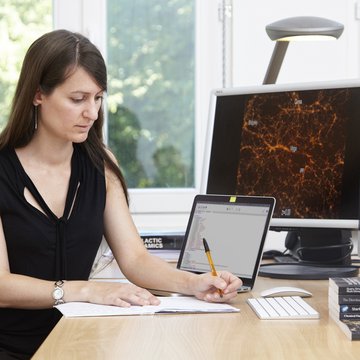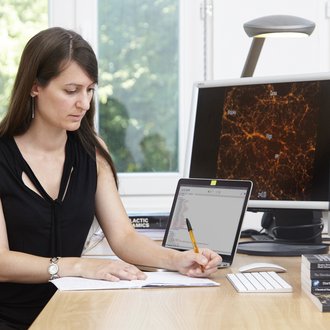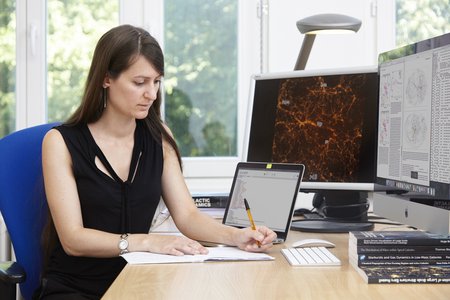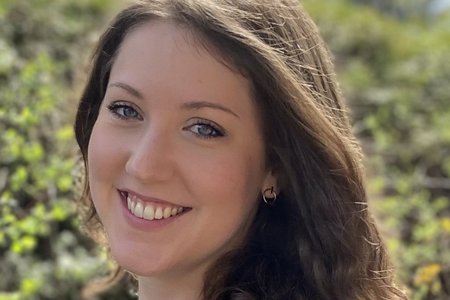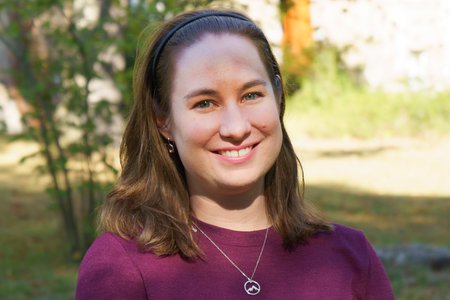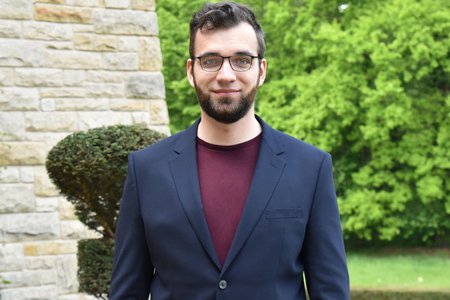L'Oréal-UNESCO Fellowship for cosmologist Jenny Sorce
To produce cosmological simulations and study our local neighbourhood in the Universe: The cosmologist Dr. Jenny Sorce received a fellowship of the L'Oréal-UNESCO For Women in Science programme. Sorce is a postdoctoral researcher at the astronomical observatory in Strasbourg, France, and a guest researcher at the Leibniz Institute for Astrophysics Potsdam (AIP). She was awarded a fellowship in the French national programme, which is granted annually, and will receive 20,000 euros.
Women account for only 28 percent of the world’s researchers, according to the UNESCO Science Report toward 2030, published in 2015. With the programme “For Women in Science”, the L’Oréal Corporate Foundation and the United Nations Educational, Scientific and Cultural Organization (in short: UNESCO) strive to support and recognize accomplished women researchers, to encourage more young women to enter the profession and to assist them once their careers are in progress.
Sorce is studying our cosmic home in a box, so to speak. She simulates “numerical boxes” filled with matter to model our local Universe’s formation and evolution, in order to understand the nature of 95 percent of its content that are still unknown. By means of supercomputers that compute the motion of matter, the boxes enable astrophysicists to reproduce the overall history of the Universe from its beginning until now. The part of the Universe we live in appears to be similar to the others, as it contains for example filaments filled with matter and voids – a cosmic web similar to a spider web. “However, when we look closer, this piece of the Universe differs from the others,” says Sorce. “This effect could be compared to looking at a zebra in a herd, among which it is indistinguishable, whereas its fur pattern has its own particularities if we study it in detail.” Thus, Sorce developed new “boxes” that resemble our local neighbourhood in the Universe and that are based on mathematical algorithms as well as astronomical observations, to which she contributed. She uses these boxes to understand our local environment and, also, to deduce its effect on global measurements when astrophysicists observe other parts of the Universe that are further away.
Sorce studied physics and astrophysics at the École normale supérieure de Lyon (ENS de Lyon), France, and did her PhD in astrophysics at the Universities of Lyon, France, and Potsdam. She was also spending a long-term research stay at the Institute for Astronomy at the University of Hawaii, USA. From 2014 to 2016, she worked as a Humboldt Research postdoctoral fellow. She was awarded the young researcher's prize of Lyon city in 2016.
Each year, the L’Oréal Corporate Foundation, in partnership with the French National Commission for UNESCO and the French Academy of Sciences, awards 30 fellowships to female researchers on the doctoral and postdoctoral level, who are working in the fields of life and physical sciences, and working or studying in France. Internationally, 275 female PhD students and Post-Docs receive one of the fellowships each year across 115 countries.
Original press release by the L’Oréal Foundation:
https://www.fondationloreal.com/categories/publications-284/lang/fr
Science contacts: Dr. Jenny Sorce, jsorce@aip.de
Media contact: Janine Fohlmeister, +49 331-7499 802, presse@aip.de
To produce cosmological simulations and study our local neighbourhood in the Universe: The cosmologist Dr. Jenny Sorce received a fellowship of the L'Oréal-UNESCO For Women in Science programme. Sorce is a postdoctoral researcher at the astronomical observatory in Strasbourg, France, and a guest researcher at the Leibniz Institute for Astrophysics Potsdam (AIP). She was awarded a fellowship in the French national programme, which is granted annually, and will receive 20,000 euros.
Women account for only 28 percent of the world’s researchers, according to the UNESCO Science Report toward 2030, published in 2015. With the programme “For Women in Science”, the L’Oréal Corporate Foundation and the United Nations Educational, Scientific and Cultural Organization (in short: UNESCO) strive to support and recognize accomplished women researchers, to encourage more young women to enter the profession and to assist them once their careers are in progress.
Sorce is studying our cosmic home in a box, so to speak. She simulates “numerical boxes” filled with matter to model our local Universe’s formation and evolution, in order to understand the nature of 95 percent of its content that are still unknown. By means of supercomputers that compute the motion of matter, the boxes enable astrophysicists to reproduce the overall history of the Universe from its beginning until now. The part of the Universe we live in appears to be similar to the others, as it contains for example filaments filled with matter and voids – a cosmic web similar to a spider web. “However, when we look closer, this piece of the Universe differs from the others,” says Sorce. “This effect could be compared to looking at a zebra in a herd, among which it is indistinguishable, whereas its fur pattern has its own particularities if we study it in detail.” Thus, Sorce developed new “boxes” that resemble our local neighbourhood in the Universe and that are based on mathematical algorithms as well as astronomical observations, to which she contributed. She uses these boxes to understand our local environment and, also, to deduce its effect on global measurements when astrophysicists observe other parts of the Universe that are further away.
Sorce studied physics and astrophysics at the École normale supérieure de Lyon (ENS de Lyon), France, and did her PhD in astrophysics at the Universities of Lyon, France, and Potsdam. She was also spending a long-term research stay at the Institute for Astronomy at the University of Hawaii, USA. From 2014 to 2016, she worked as a Humboldt Research postdoctoral fellow. She was awarded the young researcher's prize of Lyon city in 2016.
Each year, the L’Oréal Corporate Foundation, in partnership with the French National Commission for UNESCO and the French Academy of Sciences, awards 30 fellowships to female researchers on the doctoral and postdoctoral level, who are working in the fields of life and physical sciences, and working or studying in France. Internationally, 275 female PhD students and Post-Docs receive one of the fellowships each year across 115 countries.
Original press release by the L’Oréal Foundation:
https://www.fondationloreal.com/categories/publications-284/lang/fr
Science contacts: Dr. Jenny Sorce, jsorce@aip.de
Media contact: Janine Fohlmeister, +49 331-7499 802, presse@aip.de
Images
Big screen size [1000 x 666, 110 KB]
Original size [1500 x 1000, 200 KB]
